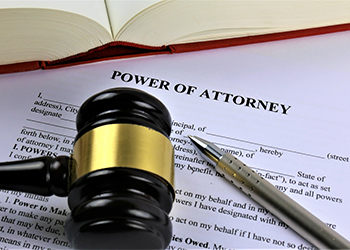Essential Elements of Power of Attorney
April 1, 2025
 When we think about securing our financial and medical future, one crucial tool to consider is a power of attorney. Whether you're planning for the future or need to appoint someone to handle your affairs in a time of crisis, understanding the essential elements of a power of attorney is key to making informed decisions.
When we think about securing our financial and medical future, one crucial tool to consider is a power of attorney. Whether you're planning for the future or need to appoint someone to handle your affairs in a time of crisis, understanding the essential elements of a power of attorney is key to making informed decisions.
At Staton & Fisher, LLP, based in Dayton, Ohio, we help clients understand how these legal documents can serve as a lifeline in situations where someone is unable to manage their affairs.
Let’s explore the different types of powers of attorney, the steps to take when creating one, and what responsibilities both the principal and agent have.
Types of Power of Attorney in Ohio
A power of attorney is a legal document that grants someone else the authority to act on your behalf. It can cover a variety of areas, from financial decisions to healthcare. However, not all powers of attorney are the same, and knowing which one fits your situation is crucial. Understanding the various types of power of attorney is fundamental in selecting the right one. The most common types are:
General Power of Attorney
A general power of attorney gives broad authority to the agent to act on behalf of the principal. This document typically includes all financial matters, such as managing bank accounts, investments, and signing contracts. It's a comprehensive form of authorization and is often used when the principal is able to manage their own affairs but may need help with certain tasks.
Durable Power of Attorney
A durable power of attorney is similar to the general one but has one key difference—it remains in effect even if the principal becomes incapacitated. This type is important for those planning for the possibility of mental or physical decline, as it allows an agent to make decisions without interruption. A durable power of attorney can address both financial and healthcare decisions.
Springing Power of Attorney
A springing power of attorney is a bit different from the general and durable types. It only becomes active under certain conditions, usually when the principal becomes incapacitated.
This type of power of attorney is often used when someone doesn’t want to give another person power over their affairs unless they’re no longer capable of managing them. The document "springs" into action only when the specified condition is met.
Healthcare Power of Attorney
A healthcare power of attorney gives the agent the authority to make medical decisions on behalf of the principal. This is crucial if the principal becomes unable to communicate their preferences due to an accident or illness.
This power of attorney allows the agent to make decisions about treatments, procedures, and end-of-life care, confirming that the principal's wishes are followed.
Key Elements of a Power of Attorney
Creating a power of attorney involves several key elements that both the principal and agent should understand clearly. These elements verify that the document is legally valid and that all involved parties understand their rights and responsibilities.
Principal’s Full Capacity
To create a power of attorney, the principal must be mentally competent. This means they are fully aware of their actions and can make informed decisions. If the principal is not mentally capable, the document may not be legally valid. It’s important that the principal understands the powers they are granting to their agent and consents to the arrangement.
Agent’s Responsibilities
When appointing an agent, it’s important to choose someone who is trustworthy and capable of handling the responsibilities outlined in the document.
Agent duties include:
Acting in good faith: The agent must always act honestly and in the best interests of the principal.
Following the principal’s instructions: The agent is required to make decisions according to the principal’s expressed preferences, as outlined in the document.
Recordkeeping: The agent should keep detailed records of any transactions or decisions made on behalf of the principal.
Avoiding conflicts of interest: The agent should avoid using the power of attorney for personal gain or acting in ways that could lead to a conflict of interest.
The agent must act in the best interest of the principal, making decisions based on what the principal would want if they were able to express their wishes.
Specific Powers
A power of attorney may specify certain powers, meaning that the agent can only perform certain actions as authorized by the principal.
Examples of specific powers may include:
Managing real estate: This includes buying, selling, or renting properties on behalf of the principal.
Handling banking and financial accounts: The agent may have authority to access and manage bank accounts, pay bills, or invest money.
Making healthcare decisions: The agent can decide on medical treatments, surgeries, and other healthcare-related issues.
The document may include broad financial responsibilities or limit the agent’s ability to make decisions in particular areas, such as managing real estate or handling investments.
Durable vs. Non-Durable Powers
As we mentioned earlier, the durable power of attorney remains valid if the principal becomes incapacitated, while a non-durable power of attorney terminates if the principal is no longer able to make decisions.
When creating a power of attorney, it’s crucial to decide whether the document should remain in effect even in the event of incapacitation, especially when planning for potential future health concerns.
How to Create a Power of Attorney in Ohio
Creating a power of attorney is relatively straightforward but requires careful attention to detail. The document must meet certain legal requirements for it to be valid.
Steps to Take:
Choose the right type of power of attorney: Consider the principal’s needs and desires. For those planning ahead for potential incapacity, a durable or healthcare power of attorney may be the best choice.
Select a trustworthy agent: The agent should be someone reliable, capable of handling responsibilities, and someone who understands the duties that come with the role.
Draft the document: Either create the document yourself using templates available online or seek legal help to confirm that the document is legally sound.
Sign the document in front of a notary: In Ohio, most power of attorney documents must be signed in front of a notary public to be legally binding. Notarization verifies the identity of the principal and makes sure that the document is executed correctly.
Distribute copies: Once the power of attorney is in place, provide copies to the agent, and any relevant institutions (like banks or healthcare providers), and keep a copy for yourself in a secure place.
Taking the proper steps to execute and distribute the document is essential to protect your interests and provide clarity for everyone involved.
Revocation of a Power of Attorney
If you decide to revoke a power of attorney at any time, the process is straightforward. You simply need to execute a revocation document, sign it, and notify your agent and any third parties that the power of attorney is no longer valid. It’s important to formally revoke any prior documents to avoid confusion.
Why You Need a Power of Attorney
Having a power of attorney in place provides peace of mind for both the principal and their loved ones. Here’s why this legal document is so crucial:
Financial management: If the principal becomes incapacitated, someone needs to manage their finances. A power of attorney verifies that there is no gap in managing bills, investments, and other financial matters.
Medical decisions: In the event of a medical emergency, a healthcare power of attorney allows a trusted person to make critical decisions on your behalf.
Avoid guardianship proceedings: Without a power of attorney, if a person becomes incapacitated, family members might have to go through lengthy guardianship proceedings to gain control over the person’s affairs. A power of attorney can avoid this.
It is a simple yet crucial document that can prevent unnecessary legal complications and stress for your loved ones.
Contact Us Today
If you are considering setting up a power of attorney in Ohio or have any questions about the process, contact us at Staton & Fisher, LLP. Located in Dayton, Ohio, we also proudly serve the areas of Huber Heights, Montgomery, Miami, and Clark County. Let us guide you through the legal steps of setting up a power of attorney and help make sure your future is protected.
